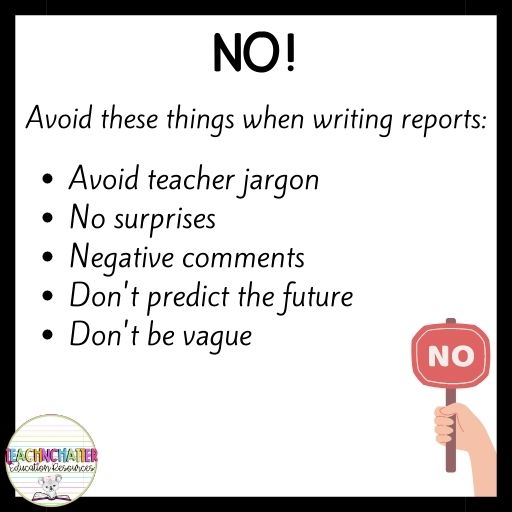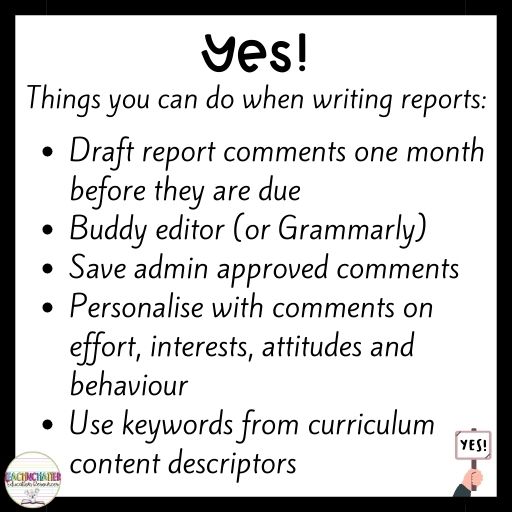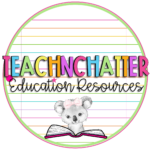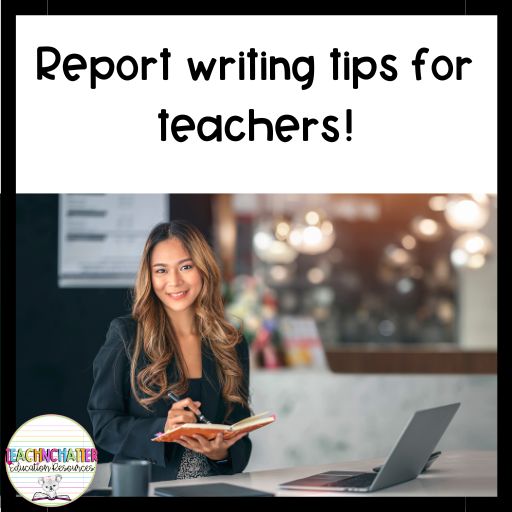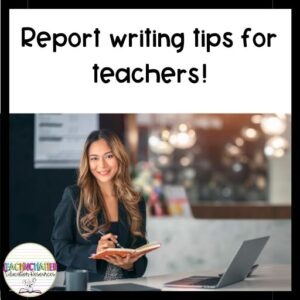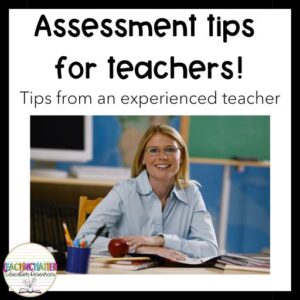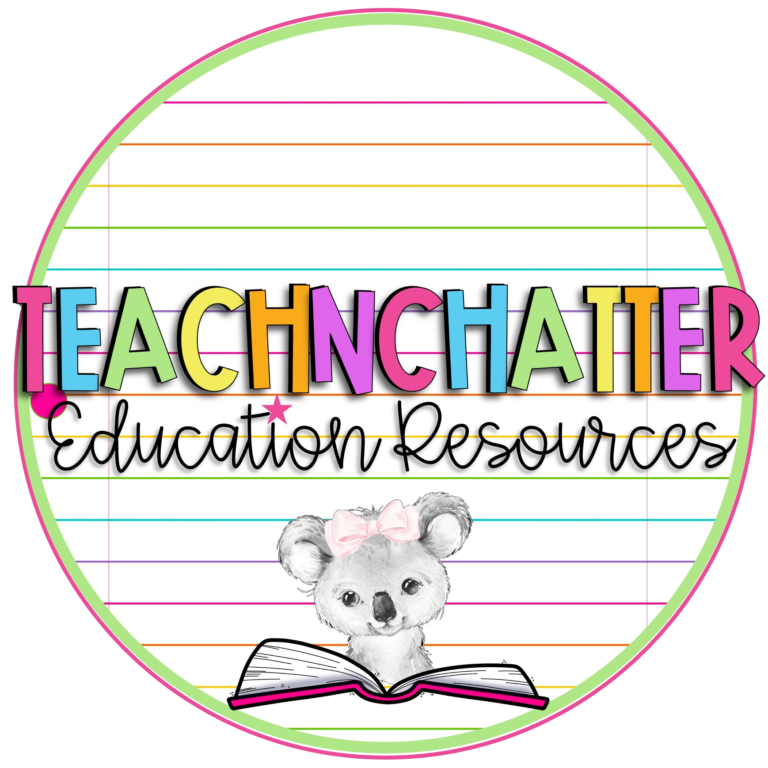Report writing tips for teachers
In my first year of teaching, I lost all of my reports the day before they were due. There was a computer “meltdown” at the school and I didn’t back them up. I had draft notes but not on the computer. It was twenty years ago, so times were different. What did I learn from this experience? Save the comments a few times over to cover yourself. I save my report comments to a thumb drive but I also email them to myself and date time it. This way, I will always find them if anything happens.
Did I manage to get my reports handed in on time? Yes! Seems remarkable, but yes I did. I went with my initial gut instinct and wrote them out. We often get so bogged down with hundreds of assessment pieces but we know our students.
Do you loathe writing reports and not know where to even begin? I will give you some tips that I have learnt along the way that will make report writing slightly easier. This is not an article on how to decide upon the grade. This is an article that gives you tips on how to write decent comments! I will cover what not to do and what to do.
Firstly, I will begin with what NOT to say. This may vary depending on country to country, school to school and so forth however, these are the standard ‘NO’ comments that all schools have agreed upon for me so far…
Reporting comments to avoid
- Negative comments – rephrase the comment to be unemotional and unbiased. For example, “Does not pay attention” can be rephrased to something like, “Requires prompts to focus for short durations.”
- Do not predict the future progress or outcomes for the student. We are not fortune tellers. Even if we think it is logical for the student to continue to progress, we cannot say so. We do not know what challenges and life hurdles lay ahead for this student. Instead of saying something like, “With continued effort and tutoring, Bill could achieve a higher grade in this area,” try to focus on the facts. You could say something such as, “Bill is participating in the X program twice a week, which focuses on phonics for reading and spelling success.”
- Avoid teacher jargon (aka specialist fancy words). A parent needs to understand what they read and they may not be in the education world. For example, instead of saying, “Subitises quantities to six,” try, “Recognises non-standard dice arrays to six.” I no longer use big words like, phonological awareness. I would rephrase it as “can hear the sounds in spoken words.”
- Avoid surprises. A parent will not appreciate opening up a report to see low progress (in some countries this would equate to a ‘D’ grade) when their child may have had a track record of receiving a ‘satisfactory progress’ grade (aka, ‘C’ grade). If you know this is going to happen, contact the parent first and discuss the upcoming grade. Have evidence with you to clearly outline why the student is achieving this grade, provide some suggestions for progress in the future and note that you have contacted this parent with the date.
- Don’t be vague. Think of what you want the parent to know about their child. What is important? Don’t add small details that don’t really need to be in the report. Word your comment very clearly.
Preferred reporting comments
- Focus on the positive. Positively word most comments. For example, instead of saying, “Hits peers when he gets angry,” try saying something like, “Requires assistance to remain calm when angry.” If you have had parent meetings and let the parent know that their child frequently hits peers, you will not need to make this statement on a report.
- State the next goal (or step) for the child’s learning plan. Above in the ‘avoid’ section, I said that it is not desirable to predict the future. What you can do is say something like, “Johnny’s Semester Two goal will be to work on addition for double digit numbers.”
- State if the student has an Individual Education Plan to monitor progress in a particular learning area.
- Use clear language. Every sentence should be clear, understandable, and nothing that needs to be explained in a later meeting.
- You can make a global statement that the student has made progress in a specific area over a semester. Think of at least one area the student has demonstrated some improvements in, even if it is a small micro-skill. Try something like, “Billy has shown progress in the quantity of writing produced in timed writing tasks. He has included more information and begun to use punctuation marks.”
- Make sure your comment matches the grade level you are giving. I always put a heading at the top of my draft comments with the grade so that it is clear in my mind when I write the comment. I can change it later if I need to but it keeps me focused.
What do you write in the general comments section of a report?
This is the section that most parents want to read and is more personal. As a parent myself, I am more interested in reading the general comment than the English or Math comment. For me, the grade in those areas is quite sufficient. Each to their own though. This is the area that you can be more personal and individualise.
In the general comments section (separate from the English or Mathematics comments section) I usually include a statement on each of the following areas; effort, social skills, attitude towards learning, special achievements, behaviour and any other interests that the student has demonstrated.
Other report writing tips:
Here are some other tips that have saved my sanity over the years:
- Begin your report writing a month before they are due. Trust me. You could get sick or some major life event could happen in report writing time. Do the draft version. If you know it’s your draft version, you’re more likely to get some words down and write freely knowing that you can edit them later on.
- Buddy editor. Get a teacher peer/colleague to check any comments that you feel could be worded negatively. Ask them to be honest.
- Grammarly. If you find grammar difficult, use the free website tool called Grammarly.
- Standard above, at level and below level comments for subject areas. I have saved administration approved comments for subject areas that I can copy and paste into reports.
- Personalise. The best area to provide personalised comments is in the general comment section where you can share the student’s personality, learning traits and habits, attitude towards learning, interests and behaviour. Learning area comments are quite difficult to write in multiple ways. There are only so many ways that you can say that a student can read words with three sounds by sounding them out!
- Key words from content descriptors. If you are struggling to find some relevant comments to make in the learning areas, go to the content curriculum descriptors. What is being asked in this learning area? Write a few key words down and use them in your comments. Just remember to make sure that the words are not too technical.
I hope these tips help you. My preferred way of writing reports has always been to write messy draft comments first as all of my gut instincts and honest observations come through in this writing time. I then go back and write the comments more professionally. I will add in the assessment data and relevant curriculum outcomes that need to be weaved through my own comments. This is my process. You do what suits you though.
Do I recommend AI for writing reports? I have not used AI in this manner (or for writing blogs either) as I prefer the personalised touch. It may be possible (just like Grammarly does) to ask AI to reword a sentence for you though. I wouldn’t spend too long on it though. You know your students so just write what you know!
Don’t over think it. Write freely. Neaten it up. Move on.
I hope these tips help you. Share your tips in the comment section!
Kind regards,
Jennifer
